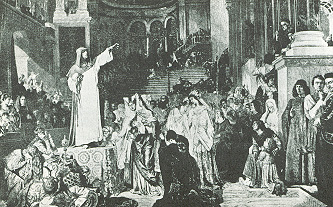
Savonarola: On Revelations

The Compendium of Revelations
Therefore I will try to gather whatever I have publicly preached up till now about the future into a brief Compendium, leaving out the special manner in which each of the revelations was made and the scriptural proofs I used when I preached.
I do intend to introduce a full account of the vision I preached on the Octave of the Annunciation of the Blessed Virgin Mary because many took it down imperfectly and corruptly and sent it to various parts of Italy. 3 I must write, because I cannot and will not for God's honor allow his mysteries to be derided or profaned, particularly by those who say that our predictions, collected faultily and with many errors by some, should be spread abroad by the printers. I have taken care to publish these prophecies in both Latin and the vernacular so that they cannot be corrupted or distorted in any way and that they may be equally available to everyone. 4 I beg all whom this Compendium reaches that if they have ever heard that I said something that was different from what is contained here, they should not believe it in any way. Our lukewarm friends, 5 that is, those wise in the ways of this world, have fabricated many things against me inside the city of Florence and more outside it. I know that there will be those who will interpret these writings in various ways, as Daniel puts it: "Many will pass by, and knowledge (that is, opinion) will be varied." 6 Many will mock these ideas. Nevertheless, I hope that devout readers and the simple of heart will gain much from reading this under the illumination of Truth Itself. It is written: "His conversation is with the simple"; 7 and again: "You have hidden these things from the wise and prudent and have revealed them to the little ones." 8
Before I begin what I have to say, the character of prophetic revelation must be clarified in order to understand these matters. Each one can then understand how God teaches prophets the things they preach to the people. Because it is written in the ninth chapter of the First Book of Kings, "One who today is called a prophet was at one time called a seer," 9 he is properly said to be a prophet who sees things that are beyond the natural knowledge of every creature, even though by means of the light of prophecy he also sees many other things that are not beyond human knowledge. 10 Since that light can attain divine things, it reaches human matters even more easily. Future contingent acts, especially those that depend on free choice, are far beyond the natural knowledge of any creature; neither man nor any other creature can know them in themselves. They are present to eternity alone because it embraces the whole of time. The rational or intellectual creature cannot know them in their causes, because the causes are balanced between producing or not producing contingent effects of this kind and the created intellect cannot discern which side they will come down on. Therefore, all arts of divining, of which "judicial" astronomy is the chief, have been condemned by the divine scriptures and the ecclesiastical canons. 11 Knowledge of future contingents is proper to divine wisdom before which everything that is past, present, and future stands open at the same moment, as it is written, "All things are naked and open to his eyes." 12 Future contingents cannot be known by any natural light; God alone knows them in his eternal light. Those to whom he deigns to reveal them receive them from him alone.
He does two things in a revelation of this kind. First, he infuses a supernatural light into the prophet, a form of participation in his eternity. From this source the prophet discerns two things in the revelations--that they are true and that they come from God. This light is so effective that it makes the prophet as certain of these two things as the natural light of reason makes philosophers certain of the truth of the first principles and makes any man certain that two and two make four. Second, God sets before the prophet in a clear way whatever he intends him to know or to predict, and he does this variously, as is written in Osee: "I have spoken over the prophets and have multiplied the vision, and I have been revealed in the hand of the prophets." 13 Sometimes he inspires what he is to predict in the prophet's intellect without any images, the way he gave wisdom to Solomon and the way David prophesied; other times he imprints in the imagination different figures and images that signify what the prophet is to understand and predict. From the power of this same light the prophet himself clearly understands the meaning of these visions, otherwise he would not be able to say, as is written in Daniel, "There is need of understanding in a vision." 14 In such visions he frequently perceives various words pronounced internally by different persons within his mind. He knows that God forms these words from the same light through the ministry of the angels.